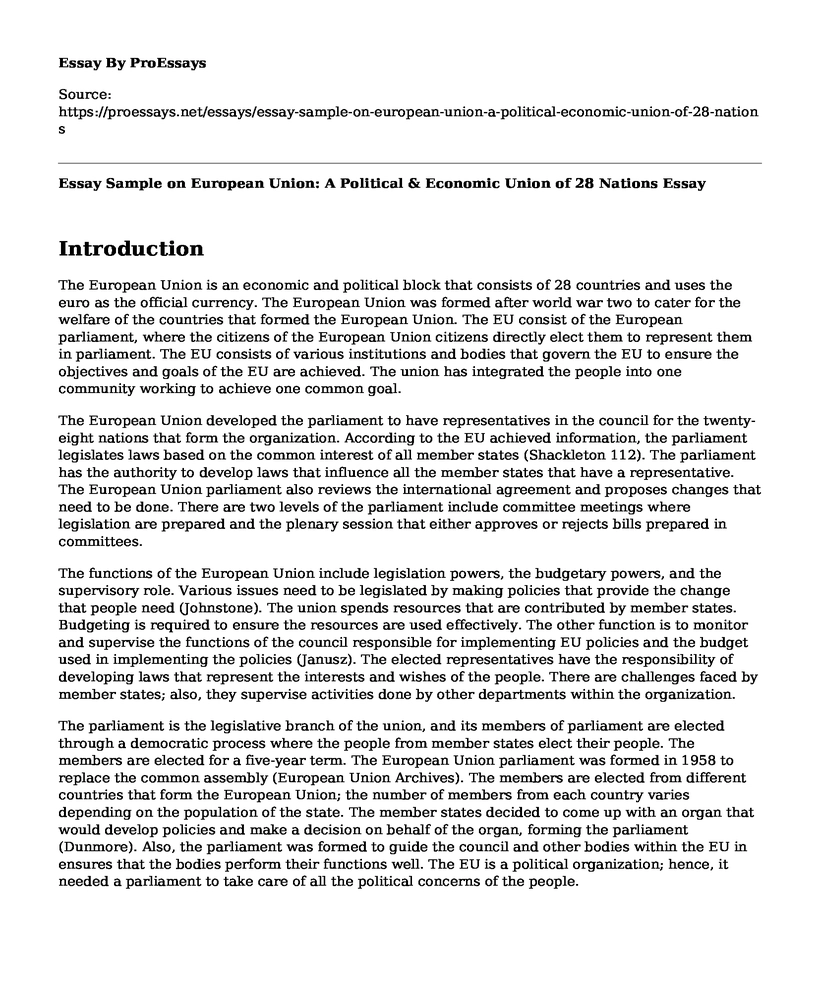Introduction
The European Union is an economic and political block that consists of 28 countries and uses the euro as the official currency. The European Union was formed after world war two to cater for the welfare of the countries that formed the European Union. The EU consist of the European parliament, where the citizens of the European Union citizens directly elect them to represent them in parliament. The EU consists of various institutions and bodies that govern the EU to ensure the objectives and goals of the EU are achieved. The union has integrated the people into one community working to achieve one common goal.
The European Union developed the parliament to have representatives in the council for the twenty-eight nations that form the organization. According to the EU achieved information, the parliament legislates laws based on the common interest of all member states (Shackleton 112). The parliament has the authority to develop laws that influence all the member states that have a representative. The European Union parliament also reviews the international agreement and proposes changes that need to be done. There are two levels of the parliament include committee meetings where legislation are prepared and the plenary session that either approves or rejects bills prepared in committees.
The functions of the European Union include legislation powers, the budgetary powers, and the supervisory role. Various issues need to be legislated by making policies that provide the change that people need (Johnstone). The union spends resources that are contributed by member states. Budgeting is required to ensure the resources are used effectively. The other function is to monitor and supervise the functions of the council responsible for implementing EU policies and the budget used in implementing the policies (Janusz). The elected representatives have the responsibility of developing laws that represent the interests and wishes of the people. There are challenges faced by member states; also, they supervise activities done by other departments within the organization.
The parliament is the legislative branch of the union, and its members of parliament are elected through a democratic process where the people from member states elect their people. The members are elected for a five-year term. The European Union parliament was formed in 1958 to replace the common assembly (European Union Archives). The members are elected from different countries that form the European Union; the number of members from each country varies depending on the population of the state. The member states decided to come up with an organ that would develop policies and make a decision on behalf of the organ, forming the parliament (Dunmore). Also, the parliament was formed to guide the council and other bodies within the EU in ensures that the bodies perform their functions well. The EU is a political organization; hence, it needed a parliament to take care of all the political concerns of the people.
Conclusion
In conclusion, the European Union has employed the member countries economically and politically, reducing conflicts and creating a healthy environment that enables businesses to thrive. The EU consists of various organs that perform their roles in making Europe high (Nicoll and Trevor). The European Union coordinate activities of several countries through one unit to help in uniting the people to achieve a common goal. The uniting of the EU members has the countries to fight the challenges together, making the challenges easier to fight.
Works Cited
Dunmore, Helen. "How Does The EU Work? - CBBC Newsround". Bbc.Co.Uk, 2018, https://www.bbc.co.uk/newsround/21168839#targetText=The%20European%20Union%20is%20a,work%20of%20running%20the%20EU.
European Union Archives. "The History of the European Union | European Union." European Union, 2016, https://europa.eu/european-union/about-eu/history_en.
Janusz, Korwin-Mikke. "European Parliament." Academics and Researchers, 2018, https://www.academia.edu/Documents/in/European_Parliament. Accessed 27 Oct 2019.
Johnstone, Lindsey. "What Does The European Parliament Do?". Euronews, 2019, https://www.euronews.com/2019/04/07/what-does-the-european-parliament-do.
Nicoll, William, and Trevor Salmon. Understanding the European Union. Routledge, 2018.
Shackleton, Michael. "The European Parliament." The institutions of the European Union 2 (2002): 104-124.
Cite this page
Essay Sample on European Union: A Political & Economic Union of 28 Nations. (2023, Feb 27). Retrieved from https://proessays.net/essays/essay-sample-on-european-union-a-political-economic-union-of-28-nations
If you are the original author of this essay and no longer wish to have it published on the ProEssays website, please click below to request its removal:
- Essay Example: Antitrust Legislation
- Compare and Contrast Mao Zedong and Kim Jung-Un's Use of Propaganda
- The US Constitution V. Texas Constitution Essay Example
- Essay Sample on 2016 US Election: Clinton Wins Popular Vote but Trump Wins Presidency
- Forming Health Policy: A Necessary Step for Healthy Nations - Essay Sample
- Community Policing: Enhancing Quality and Safety of Neighborhoods With Public Participation - Research Paper
- Essay Example on Heroin Use Increases: Challenges and Trafficking Abuse







